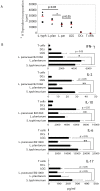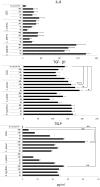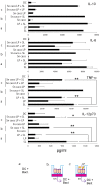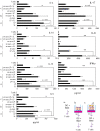Comparison of the immunomodulatory properties of three probiotic strains of Lactobacilli using complex culture systems: prediction for in vivo efficacy
- PMID: 19756155
- PMCID: PMC2738944
- DOI: 10.1371/journal.pone.0007056
Comparison of the immunomodulatory properties of three probiotic strains of Lactobacilli using complex culture systems: prediction for in vivo efficacy
Abstract
Background: While the use of probiotics to treat or prevent inflammatory bowel disease (IBD) has been proposed, to this point the clinical benefits have been limited. In this report we analyzed the immunological activity of three strains of Lactobacillus to predict their in vivo efficacy in protecting against experimental colitis.
Methodology/principal findings: We compared the immunological properties of Lactobacillus plantarum NCIMB8826, L. rhamnosus GG (LGG), L. paracasei B21060 and pathogenic Salmonella typhimurium (SL1344). We studied the stimulatory effects of these different strains upon dendritic cells (DCs) either directly by co-culture or indirectly via conditioning of an epithelial intermediary. Furthermore, we characterized the effects of these strains in vivo using a Dextran sulphate sodium (DSS) model of colitis. We found that the three strains exhibited different abilities to induce inflammatory cytokine production by DCs with L. plantarum being the most effective followed by LGG and L. paracasei. L. paracasei minimally induced the release of cytokines, while it also inhibited the potential of DCs to both produce inflammatory cytokines (IL-12 and TNF-alpha) and to drive Th1 T cells in response to Salmonella. This effect on DCs was found under both direct and indirect stimulatory conditions - i.e. mediated by epithelial cells - and was dependent upon an as yet unidentified soluble mediator. When tested in vivo, L. plantarum and LGG exacerbated the development of DSS-induced colitis and caused the death of treated mice, while, conversely L. paracasei was protective.
Conclusions: We describe a new property of probiotics to either directly or indirectly inhibit DC activation by inflammatory bacteria. Moreover, some immunostimulatory probiotics not only failed to protect against colitis, they actually amplified the disease progression. In conclusion, caution must be exercised when choosing a probiotic strain to treat IBD.
Conflict of interest statement
Figures








References
-
- Ley RE, Peterson DA, Gordon JI. Ecological and evolutionary forces shaping microbial diversity in the human intestine. Cell. 2006;124:837–848. - PubMed
-
- Artis D. Epithelial-cell recognition of commensal bacteria and maintenance of immune homeostasis in the gut. Nat Rev Immunol. 2008;8:411–420. - PubMed
-
- Rescigno M, Lopatin U, Chieppa M. Interactions among dendritic cells, macrophages, and epithelial cells in the gut: implications for immune tolerance. Curr Opin Immunol 2008 - PubMed
-
- Rescigno M. The pathogenic role of intestinal flora in IBD and colon cancer. Curr Drug Targets. 2008;9:395–403. - PubMed
-
- Lee J, Gonzales-Navajas JM, Raz E. The “polarizing-tolerizing” mechanism of intestinal epithelium: its relevance to colonic homeostasis. Semin Immunopathol. 2008;30:3–9. - PubMed
Publication types
MeSH terms
Substances
LinkOut - more resources
Full Text Sources
Other Literature Sources
Molecular Biology Databases

